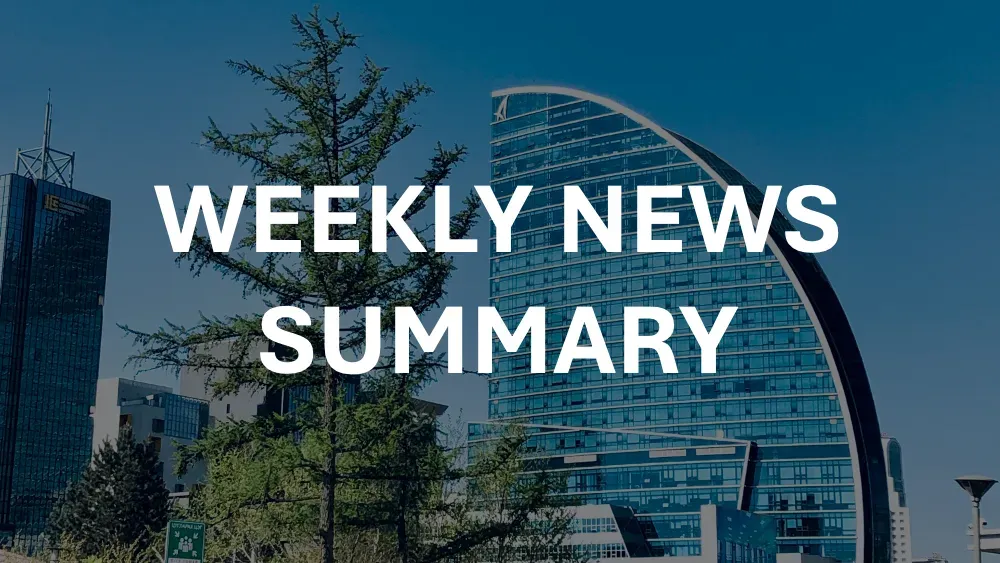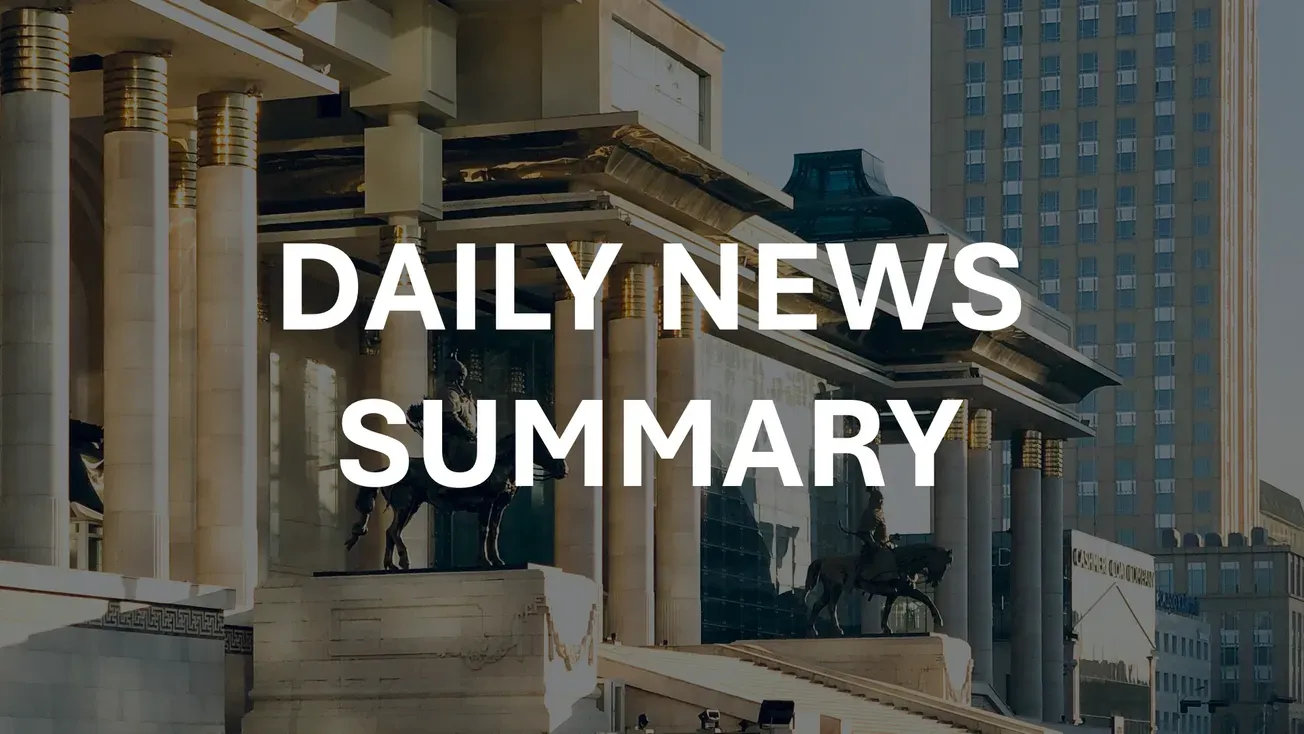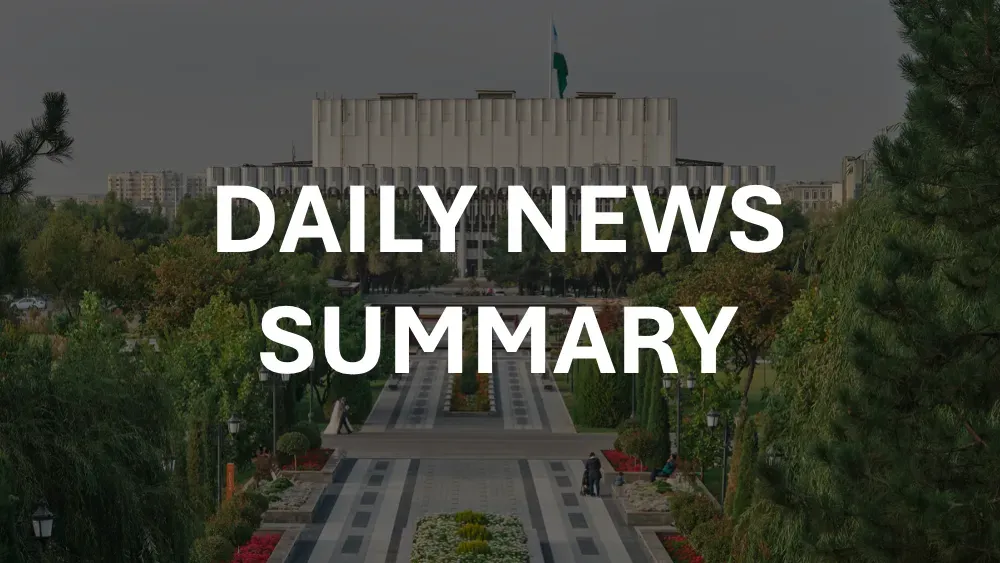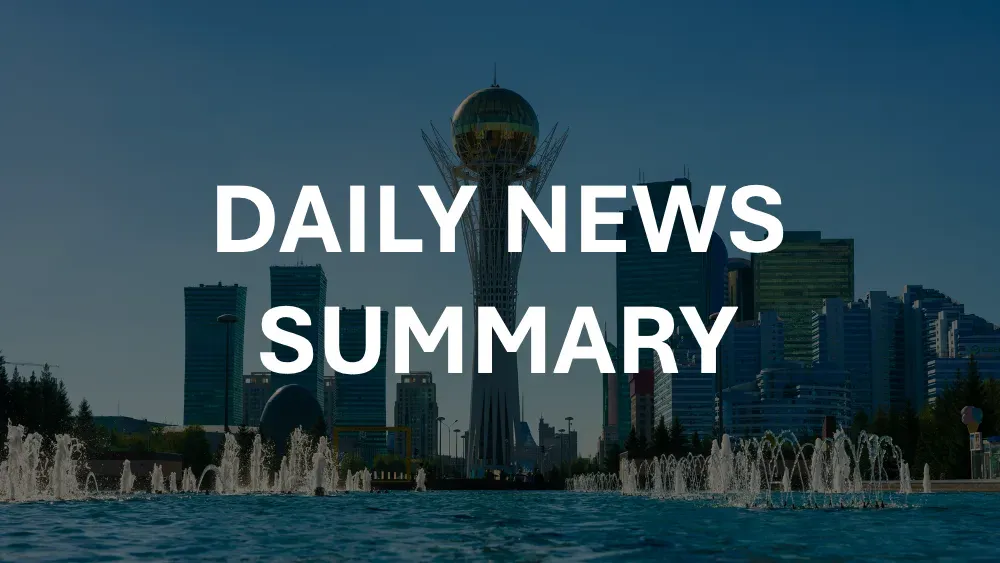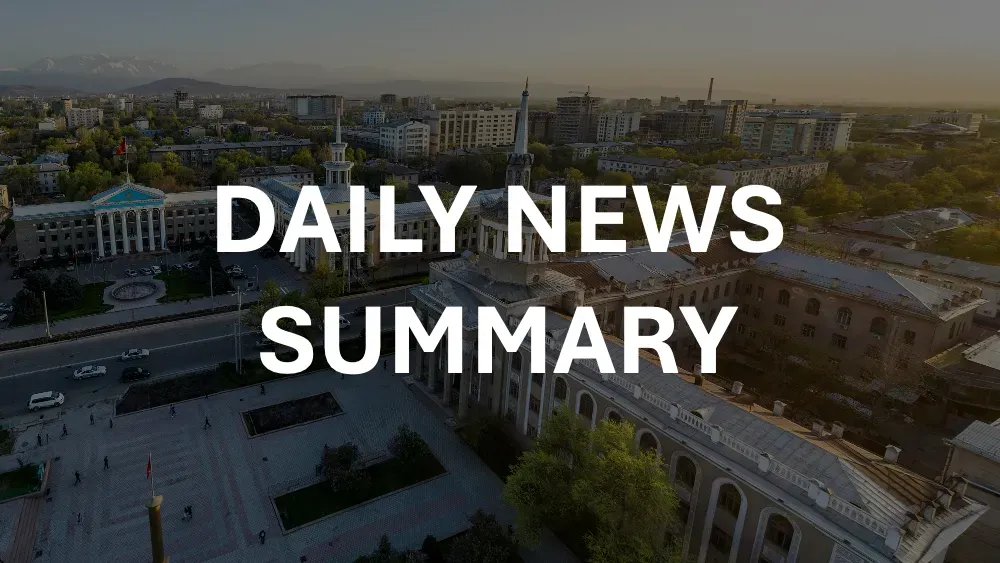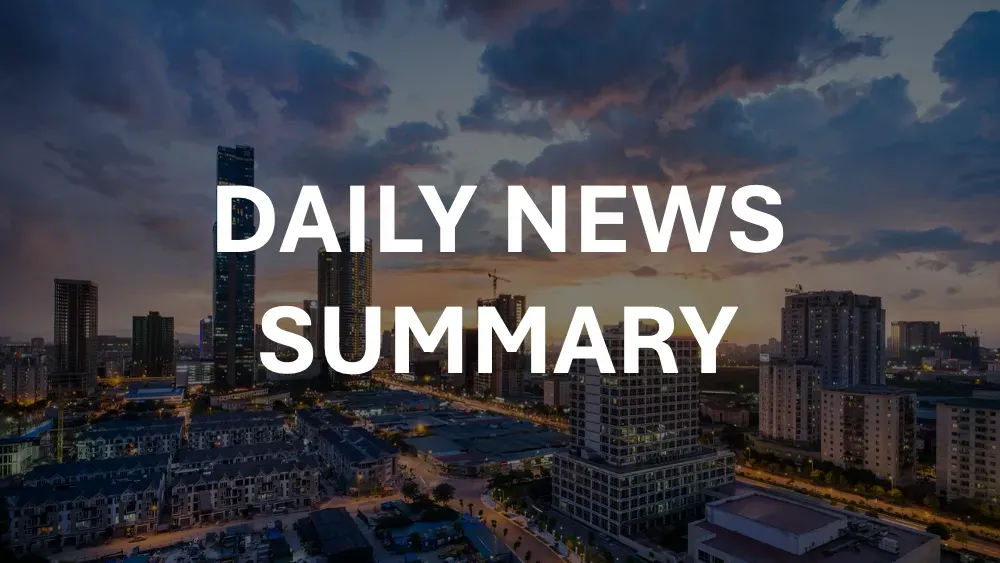This weekly digest showcases just 10 stories. Daily subscribers receive comprehensive intelligence briefs with 40 of the top stories organized by category. Don't miss the stories that matter.
Subscribe to Daily →
August 29, 2025 to September 4, 2025
This week's top 10 stories from Mongolia, selected from our daily intelligence briefs.
1. Russia, China and Mongolia Sign MOU to Advance ‘Power of Siberia‑2’ Gas Pipeline Through Mongolia
China, Russia and Mongolia used their seventh trilateral leaders’ meeting in Beijing to sign a memorandum of understanding advancing preparatory work for the Soyuz Vostok section of the Power of Siberia‑2 gas pipeline. The planned route would cross 960 km of Mongolian territory and could deliver up to 50 billion cubic meters (bcm) of Russian gas annually to China; technical studies are targeted for 2025. Leaders also reaffirmed an economic corridor program linking the three countries by rail, road and energy projects and framed the initiative as a vehicle for logistics integration and tangible economic growth in Mongolia.
The agreement signals Beijing’s intent to sustain momentum for the project within the SCO framework and Moscow’s interest in diversifying export routes to China, while Ulaanbaatar emphasizes host‑country benefits and the need for effective feasibility mechanisms. Key near‑term implications include accelerated technical and feasibility work in 2025, potential geopolitical scrutiny over energy dependencies and transit security, and opportunities for infrastructure and logistics investment across the trilateral corridor.
From daily brief: 2025-09-05
2. Government Unveils 2026 Budget That Cuts Tax Burden, Trims State Footprint, and Channels Investment to Health and Infrastructure
Mongolia’s cabinet unveiled the 2026 budget that prioritizes tax relief, a smaller state footprint, and targeted investment in health and infrastructure while foregoing a balanced-budget approach to sustain growth. Key measures include an initial MNT 800 billion of tax reductions taking effect in 2026 with further phased reforms through 2028, VAT relief tied to purchase size, expansion of the simplified VAT threshold from MNT 50 million to MNT 400 million, and raising the SME tax relief ceiling to MNT 2.5 billion. The plan also calls for consolidation of state-owned enterprises from about 108–109 to roughly 70–87, workforce cuts and stricter efficiency mandates.
Capital outlays are sharply increased for social infrastructure—health investment rises 5.5x and education spending doubles—and MNT 3.9 trillion is earmarked for energy to boost capacity and coal exports to China. Fitch affirmed Mongolia’s B+ (stable) rating amid these changes. Strategic external moves include progress on a Russia–China gas pipeline through Mongolia via a Gazprom–CNPC memorandum. Prime Minister G. Zandanshatar framed the shift as returning “taxpayers’ money” to citizens, while Finance Minister B. Javkhlan emphasized the phased nature of the relief through 2028.
From daily brief: 2025-09-04
3. Fitch Affirms Sovereign Rating at ‘B+’ with Stable Outlook, Citing Growth Prospects and Debt Decline
Fitch Ratings affirmed Mongolia’s sovereign rating at B+ with a Stable outlook, citing steady GDP growth and improving public finances that offset the country’s exposure to external shocks. Fitch projects GDP growth of 5.7% in 2025 and 5.3% in 2026–27, driven by recovering agriculture, resilient non‑mining activity and stable mining investment; lower coal prices are expected to be partially offset by stronger copper exports.
The agency highlights fiscal consolidation—deficits have been contained and government debt is forecast to fall below 40% of GDP in the medium term—and recent liability management that has smoothed external bond maturities, easing 2026–27 repayment pressure. Persisting risks include high commodity dependence, elevated financing needs and inflation averaging about 8.5% in 2025–26 due to firm domestic demand, credit growth and higher administered prices; foreign reserves are described as broadly stable.
From daily brief: 2025-09-03
4. Gazprom and CNPC Sign MOU to Route ‘Power of Siberia 2’ Gas Pipeline Through Mongolia
Mongolian Prime Minister G. Zandanshatar announced that Russia’s gas giant Gazprom and China National Petroleum Corporation (CNPC) have signed a memorandum of understanding to advance the “Power of Siberia 2” (Soyuz Vostok) pipeline routing through Mongolia, following trilateral discussions around the recent SCO summit. Framed as a long‑horizon, trans‑continental infrastructure project, the pipeline would carry Russian gas to China via Mongolian territory, potentially unlocking transit fees, ancillary investment and infrastructure upgrades in Mongolia and reinforcing Moscow–Beijing energy ties; Zandanshatar described it as “not a project for 100 years but one for a millennium.”
The move signals deeper regional energy integration and could lead to increased gas purchase volumes between Russia and China, although commercial, technical and financing details remain to be negotiated. Mongolia noted the development against a stable macro backdrop—Fitch has affirmed Mongolia’s sovereign rating at B+, Stable—suggesting the government views the route decision as strategically and economically significant for long‑term national infrastructure and revenue prospects.
From daily brief: 2025-09-03
5. Government Submits 2026 Budget to Parliament, Tightening Spending and Prioritizing Health and Education
On September 1, 2025 the Cabinet submitted the draft 2026 state budget and medium‑term fiscal framework to the State Great Khural, proposing balanced revenue of MNT 31.6 trillion against total expenditures of MNT 32.98 trillion (a fiscal deficit of about 1.3% of GDP). The plan projects GDP growth of 5.7% in 2026 rising to 6.5% by 2028, trims current spending to 24% of GDP, and seeks efficiency savings while preserving counter‑cyclical room as commodity prices soften and global uncertainty persists.
Priority allocations include roughly MNT 1.0 trillion for education, MNT 1.3 trillion for health, and a 6% increase in pensions and social welfare; tax reform under discussion would reduce burdens on households and firms by MNT 3–4 trillion. Prime Minister G. Zandanshatar framed the package as limiting spending growth, boosting incomes and essential services, and expanding space for private‑sector activity—signals the government is aiming for fiscal consolidation without undermining social priorities.
From daily brief: 2025-09-02
6. Khurelsukh Joins Record-Size SCO Summit in Tianjin, Backs Transit and Climate Agendas with China Ties in Focus
Mongolian President Ukhnaagiin Khurelsukh attended the expanded Shanghai Cooperation Organization (SCO) leaders’ session in Tianjin on September 1, 2025, as an observer and was formally received by Chinese President Xi Jinping. The summit—one of the SCO’s largest—brought together more than 20 heads of state, including leaders from Russia and India, and featured UN Secretary‑General António Guterres. Khurelsukh used the platform to reiterate Mongolia’s neutral, multi‑vector foreign policy while pitching a “Transit Mongolia” initiative to deepen cross‑border logistics, energy, tourism and a proposed trilateral gas pipeline with Russia and China.
He also positioned Mongolia as a partner for regional climate cooperation ahead of hosting UNCCD COP17 in Ulaanbaatar in 2026, highlighting domestic programs such as the “Billion Trees” campaign and food‑security measures. For Ulaanbaatar, SCO engagement offers momentum to access regional financing, markets and trilateral project opportunities while preserving observer status and balance between major powers.
From daily brief: 2025-09-02
7. Hürelsüh Attends SCO Summit in Tianjin as Observer, Plans Trilateral with Xi and Putin
Mongolian President Ukhnaagiin Hürelsüh arrived in Tianjin to attend the Shanghai Cooperation Organization’s 25th leaders’ summit on August 31–September 1 as an observer, where he will present Mongolia’s position on SCO relations, hold bilateral meetings with participating heads of state, and take part in a seventh trilateral session with Chinese President Xi Jinping and Russian President Vladimir Putin. The Mongolian delegation’s reception at Binhai International Airport by senior Chinese officials and reports that Hürelsüh met Xi signal elevated protocol; organizers say this year’s summit is one of the SCO’s largest, convening leaders from 10 countries and representatives of more than 20 international organizations.
Although no policy announcements have been reported, Hürelsüh’s observer status and planned trilateral with China and Russia underscore Mongolia’s cautious balancing between its two powerful neighbors and multilateral institutions. After the summit he will attend Beijing commemorations for the 80th anniversary of China’s victory in the War of Resistance against Japan and visit the Zhangjiakou memorial to Mongolian and Soviet soldiers, moves that combine diplomatic signaling with historical commemoration ahead of potential follow-up talks.
From daily brief: 2025-09-01
8. Gazprom Signs Memorandum to Expand Cooperation on Oil and Gas Projects
Russia’s Gazprom delegation, led by Board Chairman Alexey Miller, visited Ulaanbaatar for talks on energy cooperation with Mongolian officials including Prime Minister G. Zandanshatar. On the visit Deputy Prime Minister S. Amarsaikhan signed a memorandum of understanding with Miller to formalize cooperation in oil and gas projects and to advance long-discussed plans for a natural gas pipeline; no timelines, investment figures or route decisions were disclosed.
The MoU signals renewed momentum in bilateral energy ties that could diversify Mongolia’s energy supplies and infrastructure while reinforcing Russia’s regional energy influence. For international investors and policymakers, the agreement establishes a framework for upstream, downstream and pipeline collaboration but leaves key commercial and technical details—financing, project schedules and specific routing—open pending further negotiations.
From daily brief: 2025-08-31
9. OT to Source Power Domestically from 2028 if Tavan Tolgoi Plant Proceeds; Government Presses for Financing, Arbitration, and License Resolutions
Mongolia’s Cabinet Chief S. Byambatsogt and Oyu Tolgoi (OT) CEO Deirdre Lingenfelder agreed to accelerate negotiations on financing, licensing and arbitration as the government seeks better terms and greater oversight of the copper giant. Three minister-led task forces (Industry and Minerals, Finance, Justice) will revisit OT’s financing costs — including loan interest reductions — negotiate state equity in Ontre Resources’ “Shivee Tolgoi” and “Javkhlant” licenses inside OT’s deposit area, and coordinate Mongolia’s defence in a London arbitration. OT has committed to provide all requested information and will engage on planned downstream projects for copper smelting and gold refining.
Operationally, OT projects 350,000 tonnes of copper output in 2025 with an estimated net profit of roughly $1 billion. Importantly, OT said it would source electricity domestically from 2028 if the government proceeds with the proposed Tavan Tolgoi power plant, a move that could shift energy supply dynamics for the mine and affect Mongolia’s industrial policy and export value chain.
From daily brief: 2025-08-30
10. Fuel Rationing and Price Spikes Reported in Gobi Provinces as Supply Disruptions Persist
Fuel shortages and episodic rationing have been reported across key Gobi provinces in late August, with several stations in Umnugovi and Dundgovi limiting sales by monetary quotas or temporarily closing. Local tour operators say supply is scarce in Dalanzadgad, while a private seller in Bulgan soum is offering AI-92 at about MNT 4,000 per liter—well above Ulaanbaatar late‑August prices for gasoline and diesel. Industry Minister G. Damdinyam attributed disruptions to adjusted domestic transport schedules stemming from higher fuel use in Russia but maintained that inventories are “normal.”
Tour guides and local businesses warn the situation echoes recurring July–August shortages and has been worsened this year by hoarding and speculative pricing amid reports of potential Russian export limits, raising the risk of short‑term price spikes and localized supply bottlenecks for tourism and regional logistics.
From daily brief: 2025-08-29
These weekly highlights are a small sample of what's happening. Daily subscribers get comprehensive briefings with 40 top stories that connect the dots between events, track developing stories, and provide the context you need for informed decision-making.
Upgrade to Daily →


